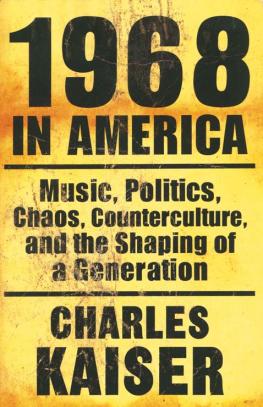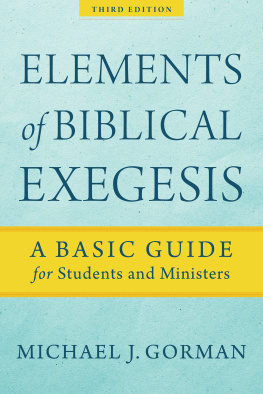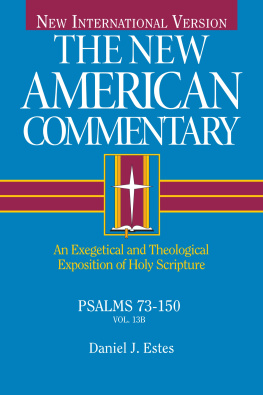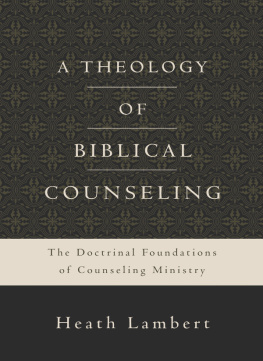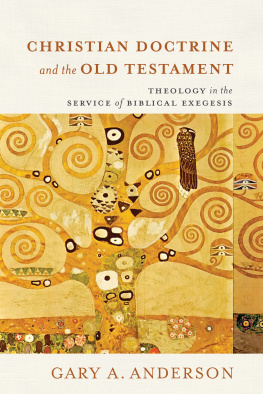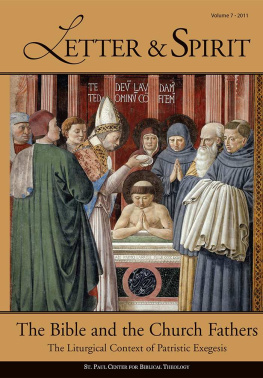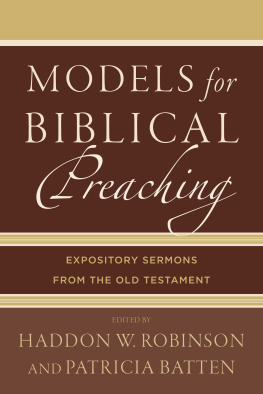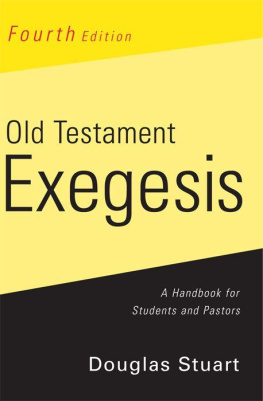Kaiser - Toward an Exegetical Theology: Biblical Exegesis for Preaching and Teaching
Here you can read online Kaiser - Toward an Exegetical Theology: Biblical Exegesis for Preaching and Teaching full text of the book (entire story) in english for free. Download pdf and epub, get meaning, cover and reviews about this ebook. year: 1998, publisher: Baker Publishing Group, genre: Religion. Description of the work, (preface) as well as reviews are available. Best literature library LitArk.com created for fans of good reading and offers a wide selection of genres:
Romance novel
Science fiction
Adventure
Detective
Science
History
Home and family
Prose
Art
Politics
Computer
Non-fiction
Religion
Business
Children
Humor
Choose a favorite category and find really read worthwhile books. Enjoy immersion in the world of imagination, feel the emotions of the characters or learn something new for yourself, make an fascinating discovery.

- Book:Toward an Exegetical Theology: Biblical Exegesis for Preaching and Teaching
- Author:
- Publisher:Baker Publishing Group
- Genre:
- Year:1998
- Rating:3 / 5
- Favourites:Add to favourites
- Your mark:
- 60
- 1
- 2
- 3
- 4
- 5
Toward an Exegetical Theology: Biblical Exegesis for Preaching and Teaching: summary, description and annotation
We offer to read an annotation, description, summary or preface (depends on what the author of the book "Toward an Exegetical Theology: Biblical Exegesis for Preaching and Teaching" wrote himself). If you haven't found the necessary information about the book — write in the comments, we will try to find it.
Toward an Exegetical Theology: Biblical Exegesis for Preaching and Teaching — read online for free the complete book (whole text) full work
Below is the text of the book, divided by pages. System saving the place of the last page read, allows you to conveniently read the book "Toward an Exegetical Theology: Biblical Exegesis for Preaching and Teaching" online for free, without having to search again every time where you left off. Put a bookmark, and you can go to the page where you finished reading at any time.
Font size:
Interval:
Bookmark:
Other Books by Walter C. Kaiser Jr.
Back Toward the Future: Hints for Interpreting Biblical Prophecy
A Biblical Approach to Personal Suffering
Classical Evangelical Essays in Old Testament Interpretation (editor)
The Communicators Commentary: Micah-Malachi
Ecclesiastes: Total Life
Hard Sayings of the Bible (with Peter H. Davids, F. F. Bruce, and Manfred T. Brauch)
Hard Sayings of the Old Testament
Have You Seen the Power of God Lately? Lessons for Today from Elijah
A History of Israel: From the Bronze Age through the Jewish Wars
An Introduction to Biblical Hermeneutics: The Search for Meaning (with Moiss Silva)
The Journey Isnt Over: The Pilgrim Psalms for Lifes Challenges and Joys
Malachi: Gods Unchanging Love
The Messiah in the Old Testament
More Hard Sayings of the Old Testament
The Old Testament in Contemporary Preaching
Psalms: Heart to Heart with God
Proverbs: Wisdom for Everyday Life
Quality Living
Quest for Renewal: Personal Revival in the Old Testament
Toward an Old Testament Theology
Toward Old Testament Ethics
Toward Rediscovering the Old Testament (edited with Lyman Rand Tucker Jr.)
A Tribute to Gleason Archer (edited with Ronald F. Youngblood)
The Uses of the Old Testament in the New

1981 by Walter C. Kaiser Jr.
Published by Baker Academic
a division of Baker Publishing Group
P.O. Box 6287, Grand Rapids, MI 49516-6287
www.bakeracademic.com
Ebook edition created 2012
All rights reserved. No part of this publication may be reproduced, stored in a retrieval system, or transmitted in any form or by any meansfor example, electronic, photocopy, recordingwithout the prior written permission of the publisher. The only exception is brief quotations in printed reviews.
eISBN 978-1-4412-1067-8
Library of Congress Cataloging-in-Publication Data is on file at the Library of Congress, Washington, DC.
To all Gods choice servants
who minister His Word to His Church
and who, under God, pledge themselves
to end the famine of the hearing
of the whole counsel of God
And especially to
Dr. Merrill C. Tenney
the one under whom I first learned
the analytical method of exegesis
and who instilled in me
an insatiable love for the Scriptures
and the idea of applying
the rudiments of this method to Hebrew
Preface
I n 1742 John Albert Bengel observed: Scripture is the foundation of the Church: the Church is the guardian of Scripture. When the Church is in strong health, the light of Scripture shines bright; when the Church is sick, Scripture is corroded by neglect; and thus it happens, that the outward form of Scripture and that of the Church, usually seem to exhibit simultaneously either health or else sickness; and as a rule the way in which Scripture is being treated is in exact correspondence with the condition of the Church. After more than two centuries we can affirm the validity of Bengels warning. The Church and the Scripture stand or fall together. Either the Church will be nourished and strengthened by the bold proclamation of her Biblical texts or her health will be severely impaired.
It is no secret that Christs Church is not at all in good health in many places of the world. She has been languishing because she has been fed, as the current line has it, junk food; all kinds of artificial preservatives and all sorts of unnatural substitutes have been served up to her. As a result, theological and Biblical malnutrition has afflicted the very generation that has taken such giant steps to make sure its physical health is not damaged by using foods or products that are carcinogenic or otherwise harmful to their physical bodies. Simultaneously a worldwide spiritual famine resulting from the absence of any genuine publication of the Word of God (Amos 8:11) continues to run wild and almost unabated in most quarters of the Church.
Not all the causes or solutions may be offered in this volume. But as one who is charged under the same Lord who is Head of the Church to prepare undershepherds for the ministry in Christs Church at large, I feel there is one place where I have a special debt to the Church which I must discharge. I have been aware for some time now of a gap that has existed in academic preparation for the ministry. It is the gap that exists between the study of the Biblical text (most frequently in the original languages of Hebrew, Aramaic, and Greek) and the actual delivery of messages to Gods people. Very few centers of Biblical and homiletical training have ever taken the time or effort to show the student how one moves from analyzing the text over to constructing a sermon that accurately reflects that same analysis and is directly dependent on it.
This volume will not solve every problem even in this one selected area. One reason it will not, I must say in all candor, is that there are no complete guides in this area. As far as this writer has been able to discover, no one has ever attempted to author an exegetical theology in English or any modern European language. This discovery in itself was startling. Here is a discipline which is at the very heart of what theological education is all about. In short, it is at once the proof and the finishing touch of the whole process. Should the ministry of the pulpit fail, one might just as well conclude that all the supporting ministries of Christian education, counseling, community involvement, yes, even missionary and society outreach, will likewise soon dwindle, if not collapse. Bengel is most accurate and very much to the point here as well.
Therefore something had to be done. Whatever is done here reflects my own attempts to rectify a difficult situation. I have been developing the syntactical-theological method of exegesis and sermon building for several decades now. However, I am also very much aware of the fact that this volume can be regarded only as an exploratory and provisional type of firstfruits. If I do not miss my guess, one positive effect of Toward an Exegetical Theology will be a spawning (here used in a positive sense) of many similar exegetical theologiesthis is all to the good.
One thing is certain: almost everyone in the field now recognizes the need for such a tool. Many others have been poised with pen in hand ready to take up the challenge and to write just such a volume. I trust that this volume may be the final encouragement for them to press on to completion what they have planned to do, for the need is as large as the fields of the earth. Perhaps after I have read all of these fine projected works, I may be able to remove the toward from my title and produce an enlarged exegetical theology, Deo volente.
I have tried to write with as large a spectrum of the body of Christ in mind as possible. Obviously, not everyone is going to find everything equally helpful since abilities and past achievements will markedly differ. The reader is urged to skip to those parts that he can more easily digest. At one or two points I have deliberately engaged in some rather technical discussions, for I wish to carry on a conversation not only with those whose orientation is more practical, but also with those who are acquainted with some of the more technical aspects and with some who may not share our own theological convictions but who are, nevertheless, also diligently seeking for answers to some of the same questions.
In my own view, I cannot see how the person who wishes to be totally prepared could hope to begin unless and until he is able to translate the text from Greek or Hebrew. However, I also know that many of Gods choice pastors, Bible teachers, missionaries, and third-world preachers and teachers, have not been so favored by circumstances and educational opportunities thus far. But their degree of accountability (and perhaps the generation they serve) will be different before the Lord than that of others who have had great privileges, but have failed to use them. Therefore, I have shown that the method expounded in this book can be profitably employed even if one has access only to a translated version of the Scriptures. True, it may require that these persons should also buy a paperback textbook to review their own grammar, certain grammatical terms, and key syntactical forms. But after all, that is what public elementary education (not to mention the secondary level of education, which is usually grades 912) is all about. In the American Colonies, people were taught to read and write, not primarily so that they could get a better job and improve their financial situation, but, in the colonists view at least, so that they could better their spiritual health by reading Gods Word for themselves. Consequently, if putting the suggestions of this book into practice means relearning a few basic facts like the definitions of nouns, verbs, adjectives, adverbs, prepositions, and the like, then so be it. Let us relearn these definitions and the basic rules of grammar and syntax, for the lives of men and women depend upon it.
Next pageFont size:
Interval:
Bookmark:
Similar books «Toward an Exegetical Theology: Biblical Exegesis for Preaching and Teaching»
Look at similar books to Toward an Exegetical Theology: Biblical Exegesis for Preaching and Teaching. We have selected literature similar in name and meaning in the hope of providing readers with more options to find new, interesting, not yet read works.
Discussion, reviews of the book Toward an Exegetical Theology: Biblical Exegesis for Preaching and Teaching and just readers' own opinions. Leave your comments, write what you think about the work, its meaning or the main characters. Specify what exactly you liked and what you didn't like, and why you think so.


